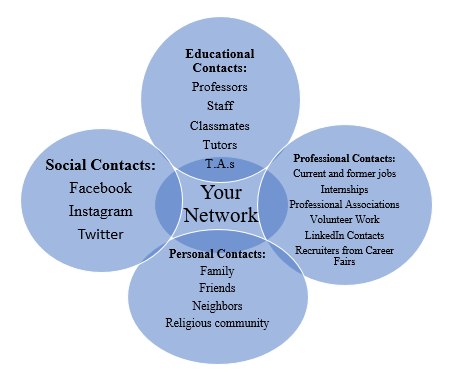How to Network
Why Network?
A study of 4 million candidate considerations revealed that, of those who sent in a resume in response to a job vacancy, 1 in 152 were hired; of those who had a referral to a position, 1 in 16 were hired!1
What is Networking?
Networking is about building and cultivating relationships to help open doors for job opportunities. It is a process of gathering information from contacts in areas of interest to you, which you can use to research career paths and develop job leads.
Getting Started - Identify Your Network
You already have a bigger, more powerful, network than you might think. Your network includes everyone you know or have met through school, work, internships, family, friends, religious and social communities, neighborhood, etc. Each connection you have is a link to another network and has the potential to link to an available job, either directly or through someone your connection knows.
Moving Forward - Use and Build Your Network
Having a network is only valuable if you use it. Let people know what you are looking for, so they can help you. Making a phone call, instead of an email, is best when possible. Start with people you know the best, and who can support you as a possible applicant for a job.
Make a Specific “Ask” to Your Immediate Network
When you make contact, be specific about what you are looking for, and ask them for help. Are you looking for a referral, a reference, or an introduction? Being too generic in your “ask” makes it difficult for your contact to help. When you ask for specific information, or leads, it is easier for someone to figure out how they can assist you.
You want to be able to quickly and concisely communicate who you are and what you are requesting. Use your “elevator pitch” to introduce yourself.
- Introduce yourself by name, university, major, and the reason for contact.
- For example: Hello, this is Joe Smith, we met at the American Medical Writers Conference last year. I am an English major at Montana State University, and I am interested in technical writing especially for the medical field. I graduate this spring and am looking for a full-time position and would like to talk to you about leads you might have that could assist me with my job search.
Expand Your Network
Take advantage of every opportunity to expand your existing network.
- Attend professional association meetings
- Attend conferences or poster sessions
- Participate in Career Fair and networking events offered on campus
- Leverage your LinkedIn contacts and ask for introductions to others
- Talk to recent graduates
- Ask for an Informational Interview from someone you admire
- Connect with organizations that interest you via social media such as LinkedIn, Facebook, Instagram or Twitter
Follow Up
Make sure to thank your contacts for their time and their expertise. Follow up with a written note or email and keep them updated periodically on your progress.
Returning the Favor - Reciprocate
Networks, like all relationships, are two-way streets. To receive value, you also need to provide value. Share your network contacts as well as your expertise or training with others who are in need. Remember to maintain your network, even once you have a position. Stay in touch periodically and add new contacts to your network regularly.
Focusing on these steps will go a long way towards building and maintaining a network to support you along your career journey.
1 The Little Grey Book of Recruiting Benchmarks, Lever, 2016

